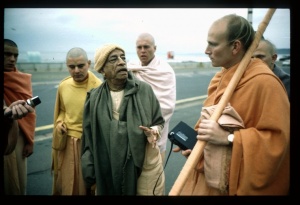SB 9.15.9: Difference between revisions
m (1 revision(s)) |
(Vanibot #0018 edit: make synonym terms in Sanskrit italic in SB - Vanisource) |
||
| Line 1: | Line 1: | ||
{{info | {{info | ||
|speaker= | |speaker=Śukadeva Gosvāmī | ||
|listener=King | |listener=King Parīkṣit | ||
}} | }} | ||
[[Category:Srimad-Bhagavatam - Canto 09 Chapter 15|s09 ]] | |||
[[Category:Bhagavatam Verses Spoken by Sukadeva Gosvami - Vanisource|091509]] | |||
<div style="float:left">'''[[Srimad-Bhagavatam]] - [[SB 9|Ninth Canto]] - [[SB 9.15: Parasurama, the Lord's Warrior Incarnation|Chapter 15: Paraśurāma, the Lord's Warrior Incarnation]]'''</div> | |||
<div style="float:right">[[File:Go-previous.png|link=SB 9.15.8]] '''[[SB 9.15.8]] - [[SB 9.15.10]]''' [[File:Go-next.png|link=SB 9.15.10]]</div> | |||
{{RandomImage}} | |||
==== TEXT 9 ==== | ==== TEXT 9 ==== | ||
<div | <div class="verse"> | ||
tāvat satyavatī mātrā | :tāvat satyavatī mātrā | ||
sva-caruṁ yācitā satī | :sva-caruṁ yācitā satī | ||
śreṣṭhaṁ matvā tayāyacchan | :śreṣṭhaṁ matvā tayāyacchan | ||
mātre mātur adat svayam | :mātre mātur adat svayam | ||
</div> | </div> | ||
| Line 17: | Line 22: | ||
==== SYNONYMS ==== | ==== SYNONYMS ==== | ||
<div | <div class="synonyms"> | ||
''tāvat''—in the meantime; ''satyavatī''—Satyavatī, the wife of Ṛcīka; ''mātrā''—by her mother; ''sva-carum''—the oblation meant for herself (Satyavatī); ''yācitā''—asked to give; ''satī''—being; ''śreṣṭham''—better; ''matvā''—thinking; ''tayā''—by her; ''ayacchat''—delivered; ''mātre''—to her mother; ''mātuḥ''—of the mother; ''adat''—ate; ''svayam''—personally. | |||
</div> | </div> | ||
| Line 24: | Line 29: | ||
==== TRANSLATION ==== | ==== TRANSLATION ==== | ||
<div | <div class="translation"> | ||
Meanwhile, because Satyavatī's mother thought that the oblation prepared for her daughter, Ṛcīka's wife, must be better, she asked her daughter for that oblation. Satyavatī therefore gave her own oblation to her mother and ate her mother's oblation herself. | Meanwhile, because Satyavatī's mother thought that the oblation prepared for her daughter, Ṛcīka's wife, must be better, she asked her daughter for that oblation. Satyavatī therefore gave her own oblation to her mother and ate her mother's oblation herself. | ||
</div> | </div> | ||
| Line 31: | Line 36: | ||
==== PURPORT ==== | ==== PURPORT ==== | ||
<div | <div class="purport"> | ||
A husband naturally has some affection for his wife. Therefore Satyavatī's mother thought that the oblation prepared for Satyavatī by the sage Ṛcīka must have been better than her own oblation. In Ṛcīka's absence, the mother took the better oblation from Satyavatī and ate it. | A husband naturally has some affection for his wife. Therefore Satyavatī's mother thought that the oblation prepared for Satyavatī by the sage Ṛcīka must have been better than her own oblation. In Ṛcīka's absence, the mother took the better oblation from Satyavatī and ate it. | ||
</div> | </div> | ||
__NOTOC__ | |||
<div style="float:right; clear:both;">[[File:Go-previous.png|link=SB 9.15.8]] '''[[SB 9.15.8]] - [[SB 9.15.10]]''' [[File:Go-next.png|link=SB 9.15.10]]</div> | |||
__NOTOC__ | |||
__NOEDITSECTION__ | |||
Revision as of 09:55, 1 December 2017

A.C. Bhaktivedanta Swami Prabhupada
TEXT 9
- tāvat satyavatī mātrā
- sva-caruṁ yācitā satī
- śreṣṭhaṁ matvā tayāyacchan
- mātre mātur adat svayam
SYNONYMS
tāvat—in the meantime; satyavatī—Satyavatī, the wife of Ṛcīka; mātrā—by her mother; sva-carum—the oblation meant for herself (Satyavatī); yācitā—asked to give; satī—being; śreṣṭham—better; matvā—thinking; tayā—by her; ayacchat—delivered; mātre—to her mother; mātuḥ—of the mother; adat—ate; svayam—personally.
TRANSLATION
Meanwhile, because Satyavatī's mother thought that the oblation prepared for her daughter, Ṛcīka's wife, must be better, she asked her daughter for that oblation. Satyavatī therefore gave her own oblation to her mother and ate her mother's oblation herself.
PURPORT
A husband naturally has some affection for his wife. Therefore Satyavatī's mother thought that the oblation prepared for Satyavatī by the sage Ṛcīka must have been better than her own oblation. In Ṛcīka's absence, the mother took the better oblation from Satyavatī and ate it.